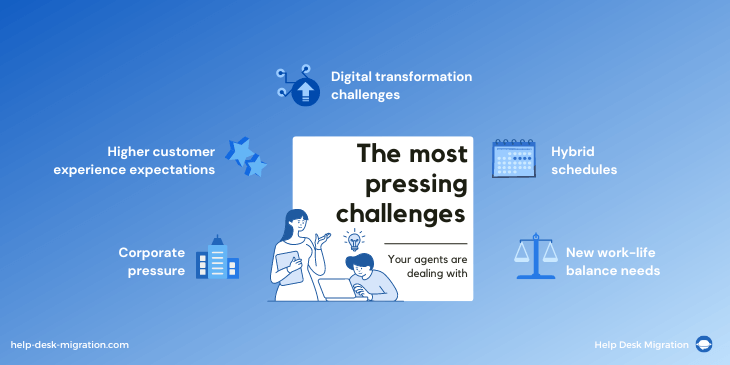Customers and their needs lie at the center of any product, service, or operation your business does. Yet, in the hunt for an increasingly better customer experience, it’s easy to lose sight of the people who make that experience possible—your employees.
In the customer support industry, a blind spot like this can lead to disaster. After all, agent experience plays an important role in shaping the quality of service your support customers receive—and consequently, the image they form of your company.
So how do you ensure your agent experience is as good as can be? This article provides an answer. In it, we’ll cover what agent experience is, why it’s essential for your business, and the list of help desk platforms that can improve it to keep your customers happy.
- HubSpot Service Hub
- Zendesk
- Gorgias
- Freshdesk
- Zoho Desk
- Salesforce Service Cloud
- Kustomer
Let’s jump right in!
What Is Customer Support Agent Experience?
Agent experience refers to how customer service agent perceives their engagement with different aspects of their work, such as:
- Workplace: their working processes, tools, and environment
- Financial satisfaction: their salary, benefits, insurance, and so on
- Psychological satisfaction: how helpful and respected they feel, and how valuable they believe their contribution to the company is
In short, agent experience is shaped by all the touchpoints an agent has with your company while performing their duties. What’s more, its quality enhances your overall customer experience, since happier support agents are more likely to be empathetic, attentive, and helpful. This human-centered approach is what customers crave, especially with the rise of automated chatbots.
Sadly, only some companies see this connection, with the majority prioritizing customer over agent experience. For example, as few as 19% of companies have made workforce well-being a strategic priority.
Let’s look at why choosing between customer or agent experience or prioritizing one over the other just doesn’t make sense.
Customer or Agent Experience: Why You Shouldn’t Prioritize One Over the Other
Customer experience is the customer’s perception of their interaction with a particular company. It’s influenced in part by agent experience since positive employee experience leads to more positive human interactions.
Here’s why agent happiness matters:
- It helps maintain effective communication. In-person communication is heavily influenced by people’s moods, emotions, and feelings. The more positive people are, the happier and more effective their communication will be. This is true for agent-customer interaction, too.
- It creates a positive image of your business. Research shows that 94% of customers consider good customer service a reason to purchase from the company again, and 82% of those customers are ready to recommend a business if they provide great customer support. Great customer support comes from happy agents.
- It maintains a healthy atmosphere within your company. Satisfied agents are not just better employees—they’re better colleagues. A healthy and warm working environment influences company success and employee performance.
- It increases productivity. As many as 79% of business owners agree that unsatisfied employees hurt productivity. Since customer support inquiries have increased significantly since COVID-19, it makes sense to ensure that agents are working at their best capacity.
These are all great reasons to focus on agent experience just as much as customer experience—a balanced strategy as opposed to an either/or. However, as disruptions increase, it gets harder to maintain this positive experience. COVID-19 was the ultimate proof, as it brought about changes that the customer service industry wasn’t ready for. These had a direct effect on agent experience.
Let’s review the challenges that today’s agents are facing.
What Changes Affect the Agent Experience?
Customer service management has undergone a considerable transformation due to the COVID-19 pandemic and other reasons, and this has influenced how support agents work. Here’s a list of the most pressing challenges agents are dealing with.
- Hybrid schedules
- Digital transformation challenges
- Higher customer experience expectations
- Corporate pressure
- New work-life balance needs
Hybrid schedules
Hybrid scheduling means a combination of working from home and the office. With hybrid work schedules becoming the new norm for many support businesses, agents have had to quickly adapt to splitting their working time between home and office. This implies not just setting up a physical workspace at home but also getting used to the necessary hardware and software for digital transformation.
Digital transformation challenges
With the rise of remote work, agents have had to learn how to work with new help desks and other tools fast, all while continuing to provide support services.
Often, support agents are expected to figure out help desk functionality by themselves with just a few tutorials to help them. As a result, they miss out on features that can streamline their workflows and give them more time with customers.
Higher customer experience expectations
New technologies have helped improve customer experience across the board, leading to higher customer expectations. For example:
- 87% of service customers get annoyed when they have to repeat themselves across the channels, and 73% will consider stopping doing business with those brands.
- 38% of customers expect agents to know the context of their query.
- 46% of customers expect to hear from a company in less than four hours after they contact them.
The upshot? Keeping customers happy has become much harder, and agents have taken on the brunt of the work with their service efforts.
Corporate pressure
Naturally, businesses want to keep an eye on the quality of customer interactions with their support team. Yet traditional metrics focus on overall agent performance, which pushes agents to increase productivity. Companies rarely track agent experience, even though this directly influences customer experience with the brand’s customer service, cross-selling and upselling results, and revenue in general.
New work-life balance needs
An astonishing 30% of all attrition in the customer support industry is due to poor work-life balance. With inquiries piling up at lightning speed, support reps feel more overwhelmed with work than ever, which often results in burnouts, missed deadlines, poor engagement with customers, and overall job dissatisfaction.
So what can you do to tackle these challenges and enhance both customer and agent experience? Read on to learn five surefire tactics!

Five Ways to Improve Your Agent Experience
Positive agent experience happens when you provide a supportive work environment, understand what counts as good performance, and ensure better communication between departments. Here’s how you can make it all happen.
1. Break silos
Support teams need to be aware of the new services/products your company is launching, your current and upcoming marketing campaigns, and how a particular customer has interacted with your company in the past. In other words, teams should never work in silos. However, for 54% of support agents, that’s exactly what happens.
Use these tips to break down silos and improve employee experience as a result:
- Enable friction-free collaboration between departments. Agents can provide much better customer support when they’re more immersed in your company. Your task is to use the right tools and implement working practices to enable smooth collaboration with other departments.
- Let agents voice their concerns. Employees need to feel safe when sharing their thoughts and critically assessing processes. Make sure your agents know who to talk to about work-related issues, and encourage them to give their thoughts on how to improve workflows.
- Collect feedback regularly. Just like customer feedback, agent feedback is a valuable source of information. Set up regular 1-1 interviews and surveys to help close the gap between how your business sees the agent’s workload, tasks, and objectives and what happens in reality.
2. Set up an internal knowledge base
Your service agents are your company's internal customers. And just like regular customers, they prefer self-service.
Creating a centralized internal knowledge base and other self-service resources will help your agents find the information they need faster, so they can provide better customer support. A knowledge base is also a great tool for onboarding new support staff.
3. Monitor agent experience metrics
You can manage what you measure, and this is always true no matter whether it comes to customer or agent experience. While metrics for agent experience can feel more limited, a net promoter score, turnover rate, and employee satisfaction index can be a good start. If your platform provides them, you can also use agent performance indicators such as average handling time (AHT), agent occupancy, and customer engagement or satisfaction.
4. Set up training and agent coaching
Coaching and training are excellent ways to support team growth, whether you want to improve technical expertise or train your agents to communicate with frustrated customers more efficiently.
Coaching can also help keep your agents on the team, as research shows that a lack of career opportunities and growth within the company pushes 27% of employees to search for a new job.
5. Empower your support agents with the right help desk
New customer service tools are a natural part of digital transformation, but when badly chosen, customer service platforms can hinder rather than help your workflows.
Make sure that the help desk solutions you use
- Support a centralized view of the customer’s journey across departments
- Help collect and process customer feedback fast
- Allow 24/7 service management
- Track and analyze agent performance
- Provide context for each query
- Allow omnichannel support
- Automate routine tasks
While most help desk platforms offer how-tos and tutorials covering the basics, you should also set up your own training, workshops, and supervision for your digital transformation initiative. In particular, your agents should know how to use the new help desks to maintain a positive customer experience in different scenarios.
Having reliable tools to work with will improve your agents’ performance — and, as a result, their experience. We’ve compiled a list of help desks worth checking out when planning your agent experience improvement strategy.
What should you do to improve agent experience?
- Break down silos and improve the employee experience. Enable friction-free collaboration between departments, listen to the support reps' concerns, and collect employee feedback regularly.
- Help your customer service agents to respond and find required information faster by creating a centralized internal knowledge base.
- Monitor agent experience metrics: a net promoter score, turnover rate, and employee satisfaction index, average handling time (AHT), agent occupancy, and customer engagement or satisfaction.
- Implement coaching and training to support team growth—improve your technical expertise or train your support reps to communicate with frustrated customers.
- Pay attention to the help desk software or ticketing system that will help rather than hinder your workflows.
7 Help Desk Platforms to Improve Agent Experience
Good agent experience is shaped by a supportive work environment, and quality tools are a key part of that environment.
Here’s a list of customer service platforms that will ensure your support representatives are equipped with the best software to do their work well.
1 HubSpot Service Hub
HubSpot Service Hub is a part of HubSpot’s extensive ITSM offering. The Service Hub customer service platform helps deepen customer relationships, ensure smooth connections with your front office, and improve team efficiency.
The system has a self-service portal with a knowledge base to reduce the need for agent interventions. It also offers a unified view of queries coming from different channels to help agents understand the context of each customer request.
2 Zendesk
Zendesk offers a variety of solutions that can be used to manage external client requests and resolve in-house customer issues. Its AI, bots, and macros help customers reach the right agent fast and provide your support team with request context in a snap.
The Zendesk platform also has a centralized agent workspace where support reps can see a customer’s history of interactions across the departments and channels. This help desk supports over 1000 plugins and integration tools, making it easy to streamline data integration for your customer service team.
3 Gorgias
The Gorgias platform centralizes all your eCommerce support tickets, allowing your team to provide fast and personalized help. This platform is great for upselling and cross-selling during customer support, as it has built-in marketing tools. It can be easily integrated with Shopify, Magento, BigCommerce, and social media channels to help your agents get more customer data.
Gorgias provides agents with a full customer history (claims, purchases, requests). It also automates repetitive tasks, so support agents spend less time on routine issues and can focus on cases that demand human attention.
4 Freshdesk
Freshdesk’s Omnichannel Suite is a solution for businesses of any size that want to provide complete support solutions. The Suite has a feature-rich, intuitive interface that provides a 360-degree customer profile view, allowing agents to find the necessary data fast.
Freshdesk also supports cross-team and hybrid collaboration, which gives departments a holistic view of customer feedback, requests, buying behavior, and other data. Its Ticket Field Suggester and Canned Response options allow agents to prioritize and distribute tickets across channels, thus reducing customer waiting time.
5 Zoho Desk
Omnichannel presence, powerful agent and customer analytics, predictive intelligence, and centralized knowledge hub—you get all of this and more from Zoho Desk. It’s a platform that combines help desk features with marketing tools to help you focus on building long-lasting customer relationships.
Zoho Desk offers rich customization and easy deployment, which is great for startups and enterprise-level solutions. Plus, new members can try Zoho Desk plans for free to see which suits them best.
6 Salesforce Service Cloud
Salesforce Service Cloud is Salesforce’s offering for personalized customer support. The platform is powered with features such as Case Management, Automation, Self-Service, and digital contact centers to simultaneously provide your agents with reliable tools and cut support costs.
This help desk is an excellent choice if your business needs telephony, voice, and video support features to connect with clients. The solution also has Workforce Engagement features (Knowledge base, Self-Service, Feedback Management) aimed at improving agent experience.
7 Kustomer
As a part of Meta, Kustomer is an ideal CRM for those businesses that rely heavily on e-commerce and social media. This solution helps you understand your customers better, manage omnichannel support easily, and deploy AI-based chatbots to automate routine agent interaction.
The Kustomer platform makes it easy to route, tag, and personalize service and identify future customer needs. Plus, its self-service feature gives your customers greater autonomy and leads to reduced request volume.
The help desk change process requires a lot of preparations and efforts. That’s clear. So leave data transfer to the Help Desk Migration team. Our automated Migration Wizard will help to tune up your data migration easily and quickly.
Got some specific requirements—custom fields, extra tags, filtering, or date of transfer? We’ll help you out with data migration planning. Contact our support team and our agents will provide you with solutions to your requirements.
Recap: Agent Experience Impacts Customer Experience
A positive agent experience is key to ensuring your customer experience remains top-notch. Happy and empowered agents are more likely to listen to customer needs more attentively, show more empathy, and keep customers satisfied with the services they receive from your company. All of this improves retention, increases revenue, and enhances customer loyalty.


